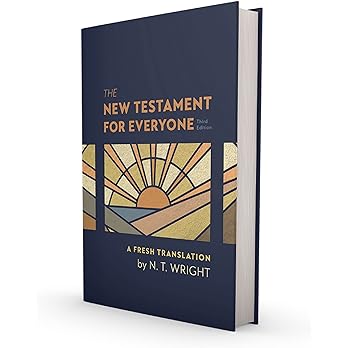Translating the New Testament from Greek is more of an art than a science, and one actually needs be a skilled writer to do it well, without whittling off the sharp edges or wrongly decoding the puzzling texts in the New Testament. Here, now in a third edition, which varies little from the previous two, is a very readable and clear New Testament translation in an edition with large enough print so that even those who are visually challenged will find quite useable. Detailed notes are eschewed, as well as detailed text critical discussions, so we have an unfettered and uncluttered translation. This one is neither an overly literalistic word for word translation, which more often than not, makes it more not less difficult for the average reader to understand the meaning of the text, nor is this an expansive paraphrase either. It takes a via media on the spectrum of translation and does so in good fashion. I always have pet or test texts I use to see if the translator does a good job, and at the same time has a fresh way of putting things, and Tom’s translation passes these tests. Here are a couple of examples:
Acts 2.11: “We can hear them speaking about the powerful things God has done– in our own languages.” In short they are speaking in various foreign languages, and miraculously so. They are not merely hearing in their own languages through a miracle of hearing. In short, this text has to do with what my Greek students regularly pray for– a miraculous and overnight ability to speak the relevant Biblical language. Thus this text is not about glossolalia or speaking in angelic tongues, but there are certainly other texts in the NT that refer to this, such as 1 Cor. 14.
In Phil. 4.12-13 we read: “I know how to do without and I know how to cope with plenty. In every possible situation I have learned the hidden secret of being full and hungry, of having plenty and going without and its this— I have strength for everything in the one who gives me power.” In short 4.13 should not be the so-called superman verse– ‘I can do all things in him who strengthens me’. In context, this last verse is not about DOING, it is in fact about enduring the extremes of existence by God’s grace and strength. In short it is not a call to ‘do all things’, it’s a call to godliness with contentment in any situation.
Throughout Tom has used inclusive language where it is warranted. For example, in Mark 2.27 we read “the sabbath is made for humans…not humans for the sabbath; so the son of man is master even of the sabbath”. This way of rendering the verse makes clear Jesus is not suggesting the sabbath is just for men, and at the same time he distinguishes himself as a unique human, called the son of man (see Dan. 7) who has authority over even the sabbath.
There are of course some texts where I would disagree with the translation for instance at John 3.16, which is not about how much God loves the world but rather in what fashion he has loved it– by sending his Son of save the world. Οὕτως here and elsewhere does not mean ‘so’ as in ‘for God so loved…’ it means ‘for in this manner’. (cf. Mt. 3.15 or 5.12).
Of course no translation is perfect, and when a particular person chooses to do a translation on his or her own, this is not the same as a team translation where there is more possibility of checks and balances from various voices at the table, especially with controversial or beloved texts like John 3.16. At the same time, a drawback of a team translation is that it is hard to maintain a consistent style and vocabulary, which is less of a problem for a gifted individual who can distill things to any level of discourse like Tom can. So on the whole Tom’s translation is very good, and can be recommended to laity and clergy alike. Here’s hoping it prompts more people to read the NT cover to cover.














